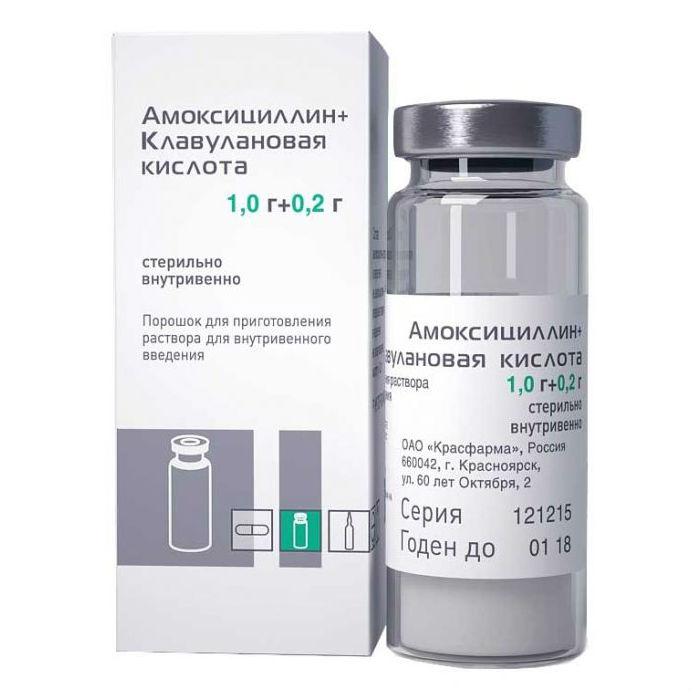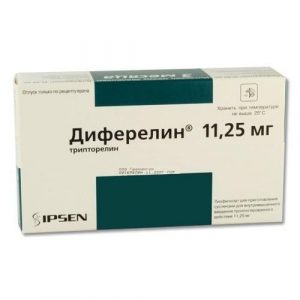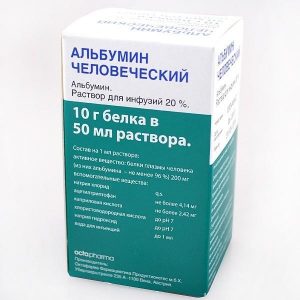Description
Pharmacological action
Combined preparation of amoxicillin and clavulanic acid – a beta-lactamase inhibitor. It acts bactericidal, inhibits the synthesis of the bacterial wall.
Active against aerobic gram-positive bacteria (including beta-lactamase producing strains): Staphylococcus aureus aerobic gram-negative bacteria: Enterobacter spp., Escherichia coli, Haemophilus influenzae, Klebsiella spp., Moraxella catarrhalis. The following pathogens are only sensitive in vitro: Staphylococcus epidermidis, Streptococcus pyogenes, Streptococcus anthracis, Streptococcus pneumoniae, Streptococcus viridans, Enterococcus faecalis, Corynebacterium spp., Listeria monocytogenes spp. Peppoccus ppp. as well as aerobic gram-negative bacteria (including beta-lactamase producing strains): Proteus mirabilis, Proteus vulgaris, Salmonella spp., Shigella spp., Bordetella pertussis, Yersinia enterocolitica, Gardnerella vaginalis, Neisseria meningitidis, Neisseria gheeriemieriemieriemierieria gierieriemierieria gierieriemierieria gierii formerly Pasteurella), Campylobacter jejuni anaerobic gram-negative bacteria (including strains producing beta-lactamases): Bacteroides spp., including Bacteroides fragilis.
Clavulanic acid suppresses II, Type III, IV and V beta-lactamases are not active against type I beta-lactamases produced by Pseudomonas aeruginosa, Serratia spp., Acinetobacter spp. Clavulanic acid has a high tropism for penicillinases, due to which it forms a stable complex with the enzyme, which prevents the enzymatic degradation of amoxicillin under the influence of beta-lactamases.
Pharmacokinetics of
After oral administration, both components are rapidly absorbed in the digestive tract. Simultaneous food intake does not affect absorption. TCmax – 45 minutes After oral administration at a dose of 250/125 mg every 8 hours, Cmax of amoxicillin – 2.18-4.5 Ојg / ml, clavulanic acid – 0.8-2.2 Ојg / ml, at a dose of 500/125 mg every 12 hours of Cmax amoxicillin – 5.09-7.91 Ојg / ml , clavulanic acid – 1.19-2.41 Ојg / ml, at a dose of 500/125 mg every 8 hours, Cmax of amoxicillin – 4.94-9.46 Ојg / ml, clavulanic acid – 1.57-3. 23 Ојg / ml, at a dose of 875/125 mg Cmax of amoxicillin – 8.82-14.38 Ојg / ml, clavulanic acid – 1.21-3.19 Ојg / ml.
After iv administration in doses of 1000/200 and 500/100 mg Cmax of amoxicillin – 105.4 and 32.2 Ојg / ml, respectively, and clavulanic acid – 28.5 and 10.5 Ојg / ml.
The time to reach a maximum inhibitory concentration of 1 Ојg / ml for amoxicillin is similar when used after 12 hours and 8 hours in both adults and children.
Plasma protein binding: amoxicillin – 17-20%, clavulanic acid – 22-30%.
Both components in the liver are metabolized: amoxicillin – 10% of the administered dose, clavulanic acid – 50%.
T1 / 2 after administration at a dose of 375 and 625 mg – 1 and 1.3 hours for amoxicillin, 1.2 and 0.8 hours for clavulanic acid, respectively. T1 / 2 after iv administration at a dose of 1200 and 600 mg – 0.9 and 1.07 h – for amoxicillin, 0. 9 and 1.12 h for clavulanic acid, respectively. It is excreted mainly by the kidneys (glomerular filtration and tubular secretion): 50-78 and 25-40% of the administered dose of amoxicillin and clavulanic acid are excreted unchanged, respectively, during the first 6 hours after administration.
Indications
Treatment of infectious and inflammatory diseases caused by sensitive pathogens: lower respiratory tract infections (bronchitis, pneumonia, pleural empyema, lung abscess) infections of the ENT organs (sinusitis, tonsillitis, otitis media) infections of the genitourinary system and pelvic organs (pyelone , pyelitis, cystitis, urethritis, prostatitis, cervicitis, salpingitis, salpingoophoritis, tubo-ovarian abscess, endometritis, bacterial vaginitis, septic abortion, postpartum sepsis, pelvic peritonitis, mild chancroid, gonorrhea) and fektsii skin and soft tissues (erysipelas, impetigo, secondarily infected dermatitis, abscesses, cellulitis, wound infection) Osteomyelitis postoperative infection.
Infections prevention in surgery.
Contraindications
Hypersensitivity to the drug’s components (including cephalosporins and other beta-lactam antibiotics) infectious mononucleosis (including the appearance of a measles-like rash) phenylketonuria jaundice episodes or liver dysfunction due to clavulanamines with clavulanamines or clavylanamines acid in the history of QA less than 30 ml / min (for tablets 875 mg / 125 mg).
Precautions
Pregnancy, lactation, severe liver failure, gastrointestinal diseases (including history of colic associated with penicillins), chronic renal failure.
Special instructions
During the course of treatment, it is necessary to monitor the state of the function of the hematopoietic organs, liver and kidneys.
In order to reduce the risk of side effects from the gastrointestinal tract, the drug should be taken with meals.
Perhaps the development of superinfection due to the growth of microflora insensitive to it, which requires a corresponding change in antibiotic therapy.
May produce false positive results in urine glucose tests. In this case, it is recommended to use the glucose oxidant method for determining the concentration of glucose in the urine.
In patients with hypersensitivity to penicillins, cross allergic reactions with cephalosporin antibiotics are possible.
Composition
Powder for preparing a solution for iv administration 1 vial: amoxicillin (in the form of sodium salt) 1 g of clavulanic acid (in the form of potassium salt) 200 mg.
Dosage and administration
Inside, iv.
Dosages are given in terms of amoxicillin. The dosage regimen is set individually depending on the severity of the course and the location of the infection, the sensitivity of the pathogen.
Children up to 12 years of age – in the form of a suspension, syrup or drops for oral administration. A single dose is set depending on age: children up to 3 months – 30 mg / kg / day in 2 divided doses 3 months and older – with mild infections – 25 mg / kg / day in 2 divided doses or 20 mg / kg / day in 3 divided doses, for severe infections – 45 mg / kg / day in 2 divided doses or 40 mg / kg / day in 3 divided doses.
Adults and children over 12 years of age or weighing 40 kg or more: 500 mg 2 times / day or 250 mg 3 times / day. For severe infections and respiratory tract infections – 875 mg 2 times / day or 500 mg 3 times / day.
The maximum daily dose of amoxicillin for adults and children over 12 years old is 6 g, for children under 12 years old – 45 mg / kg body weight.
The maximum daily dose of clavulanic acid for adults and children over 12 years old is 600 mg, for children under 12 years old – 10 mg / kg body weight.
Suspension is recommended in adults with difficulty swallowing.
When preparing the suspension, syrup and drops, water should be used as solvent.
When given intravenously, adults and adolescents over 12 years of age are given 1 g (amoxicillin) 3 times / day, and if necessary, 4 times / day. The maximum daily dose is 6 g. For children 3 months-12 years old – 25 mg / kg 3 times / day in severe cases – 4 times / day for children under 3 months: premature and in the perinatal period – 25 mg / kg 2 times / day, in the postperinatal period – 25 mg / kg 3 times / day.
Duration of treatment – up to 14 days, acute otitis media – up to 10 days.
For the prevention of postoperative infections during operations lasting less than 1 h, a dose of 1 g iv is administered during introductory anesthesia. For longer operations – 1 g every 6 hours for a day. At high risk of infection, administration can be continued for several days.
In chronic renal failure, the dose and frequency of administration are adjusted depending on QC: with QC of more than 30 ml / min, dose adjustment is not required with QC of 10-30 ml / min: inside – 250-500 mg / day every 12 hours iv – 1 g, then 500 mg iv in case of CC less than 10 ml / min – 1 g, then 500 mg / day iv or 250-500 mg / day orally in one go. For children, doses should be reduced in the same way.
Hemodialysis patients – 250 mg or 500 mg orally in one dose or 500 mg iv, an additional 1 dose during dialysis and another 1 dose at the end of the dialysis session.
Side effects of the
From the digestive system: nausea, vomiting, diarrhea, gastritis, stomatitis, glossitis, increased activity of hepatic transaminases, in rare cases – cholestatic jaundice, hepatitis, liver failure (more often in older men, with prolonged therapy) pseudomembranous and hemorrhagic colitis (can also develop after therapy), enterocolitis, black hairy tongue, darkening of tooth enamel.
From the hemopoietic organs: a reversible increase in prothrombin time and bleeding time, thrombocytopenia, thrombocytosis, eosinophilia, leukopenia, agranulocytosis, hemolytic anemia.
From the nervous system: dizziness, headache, hyperactivity, anxiety, behavior change, convulsions.
Local reactions: in some cases, phlebitis at the site of intravenous administration.
Allergic reactions: urticaria, erythematous rashes, rarely – multiforme exudative erythema, anaphylactic shock, angioedema, extremely rare – exfoliative dermatitis, malignant exudative erythema (Stevens-Johnson syndrome), allergic vascular syndrome, pustulosis.
Other: candidiasis, development of superinfection, interstitial nephritis, crystalluria, hematuria.
active substance
Amoxycillin, Clavulanic acid
Terms of delivery from
pharmacies Prescription
dosage form
injection




